homepage news
YEAR IN REVIEW: Top 10 national news stories of 2017
From Trump’s attacks to sexual misconduct scandals, a look back

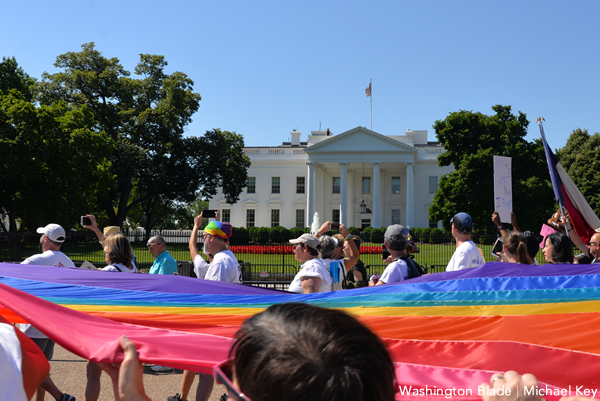
The Equality March for Unity and Pride passes by the White House. (Washington Blade photo by Michael Key)
As many predicted, 2017 brought an end to the progressive Obama era and the beginning of an assault on LGBTQ rights from the new Trump administration. Below is a ranking of the 10 biggest LGBTQ stories of the year as determined by Blade staff.
10. The push for ‘religious freedom’ bills
Although anti-LGBT forces sought to pass an anti-trans bathroom bill in Texas, the measure was defeated in the state legislature following outcry from the business community and LGBT advocates.
The measure, which would have barred transgender people from using bathrooms in public schools, government buildings and public universities based on their gender identity, seemed dead when it failed to pass during the general session, but Texas Gov. Greg Abbott called a special session exclusively for the purpose of passing the bill.
Major businesses — including IBM, which has a large presence in Texas — opposed the legislation. Although the Senate approved the legislation, the House didn’t follow suit and the bill finally died.
Although the bathroom bill was defeated, the legislature passed and Abbott signed into law an anti-LGBT “religious freedom” measure allowing taxpayer-funded adoption agencies in Texas to refuse placements to LGBT homes. South Dakota and Alabama enacted similar laws this year.
9. Sexual misconduct scandals ensnare Spacey, Takei
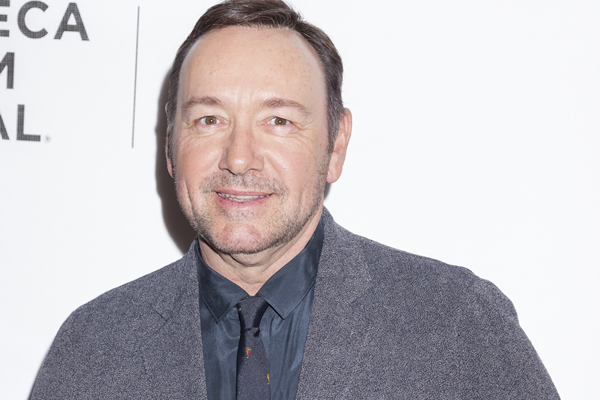
Actor Kevin Spacey drew widespread condemnation after coming out as gay in the wake of sexual assault allegations against him. (Photo by Vonora; courtesy Bigstock)
The tidal wave of allegations of sexual misconduct this year that brought down numerous public figures beginning with Hollywood mogul Harvey Weinstein also affected gay men in media.
“Star Trek” actor Anthony Rapp accused Kevin Spacey of sexually assaulting him in 1986, when Rapp was 14. The “House of Cards” star issued a statement saying he didn’t recall the incident and was coming out as gay.
That didn’t stop outcry against him and 15 more accusers from coming forward, which essentially ended Spacey’s career. Netflix fired Spacey, his Gore Vidal biopic was cancelled and he was cut from scenes in the Ridley Scott film “All the Money in the World.”
Also accused of sexual misconduct was George Takei. A former model said the “Star Trek” actor groped him in 1981. Takei denied the allegation and was able to weather it after no subsequent allegations emerged.
8. Edith Windsor dies

Edie Windsor served as one of the Grand Marshals of the 2017 Capital Pride parade. (Washington Blade file photo by Michael Key)
Four years after her historic victory at the U.S. Supreme Court against the anti-gay Defense of Marriage Act, Edith Windsor died this year at age 88.
Dubbed the “mother of marriage equality,” Windsor sued the U.S. government because under DOMA she was required to pay $363,000 in estate taxes after the death of her spouse, Thea Speyer. In 2013, Windsor’s lawsuit led the Supreme Court to strike down the law in a decision that was a precursor to the 2015 ruling guaranteeing marriage equality nationwide.
After the decision, Windsor continued her activism, serving as grand marshal for Capital Pride in 2016. Windsor supported the Democratic Party and Hillary Clinton in the 2016 election.
At her memorial service at Temple Emanu-el in New York City, Clinton made a surprise appearance and honored Windsor as someone who “helped change hearts and minds, including mine.”
7. Hurricane Maria devastates Puerto Rico

Residents of La Perla, an oceanfront neighborhood in San Juan, that suffered extensive damage during Hurricane Maria, have erected handwritten signs asking for water and other basic supplies. (Photo courtesy of Wilfred Labiosa/WAVES AHEAD)
Amid a Trump administration response widely seen as inadequate, much of Puerto Rico this year was devastated in the aftermath of Hurricane Maria, including its LGBT residents and an HIV/AIDS organization.
An estimated 70 percent of the island was without power six weeks after the storm, which claimed the lives of nearly 500 people there. More than 50,000 Puerto Rico residents were displaced from their homes, many of whom resorted to consuming water from a contaminated site.
Also without power was the San Juan-based organization Bill’s Kitchen, which delivers meals to people with HIV/AIDS. Food and Friends in D.C. donated between $30,000-$35,000 to the organization to buy a generator for the Puerto Rico organization.
San Juan Mayor Yulín Cruz, a Democrat, called the situation a “terrifying humanitarian crisis” and called for the U.S. government to speed up its response. That angered President Trump, who tweeted Puerto Rico officials “want everything to be done for them.”
6. Roy Moore loses Senate bid
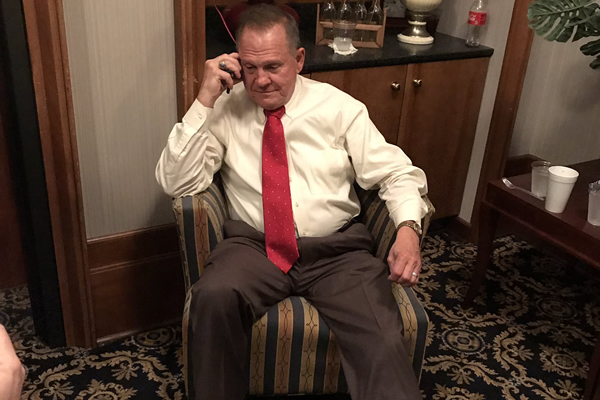
Roy Moore (Photo courtesy of Twitter)
In an answer to the prayers of LGBT people, Democrat Doug Jones defeated notorious homophobe Roy Moore this year in a special election for a U.S. Senate seat.
Moore was defeated after nine women accused him sexual misconduct. Six said he inappropriately dated them decades ago when they were teenagers and he was in his 30s. Three others accused him of sexual assault.
Over the course of his long career, Moore established an anti-LGBT record. Moore urged Alabama probate judges to refuse to marry same-sex couples after the 2015 Supreme Court ruling for marriage equality, which resulted in him being removed as Chief Justice of the Alabama Supreme Court.
Jones, however, was endorsed by the Human Rights Campaign and supports LGBT rights. He said on video President Trump was wrong to have rescinded Title IX guidance protecting transgender students to ban transgender people from the U.S. military.
5. Vegas replaces Orlando as deadliest shooting

Cameron Robinson, on right, died and his boyfriend Robert Eardley was wounded in the Las Vegas shooting. (Photo courtesy of GoFundMe)
A deadly attack at a country music show in Las Vegas this year surpassed the massacre at a gay nightclub in Orlando, Fla., as the worst mass shooting in modern U.S. history.
The shooter, Stephen Paddock, killed 59 people by converting an assault rifle into an automatic weapon and firing upon concert-goers from a room in Mandalay Bay hotel. An additional 546 individuals were wounded.
The motive for Paddock, who killed himself as law enforcement officials entered his room, remains unknown.
Among the victims was a Utah gay couple: Cameron Robinson and Robert Eardley. Robinson died after being struck in the neck. Eardley was wounded after being shot in the back.
The tragedy — and an additional shooting this year at a church in Sutherland Springs, Texas — did nothing to influence Congress to advance gun control legislation amid ongoing efforts from activists like Gays Against Guns to convince lawmakers to act.
4. National Equality March draws thousands
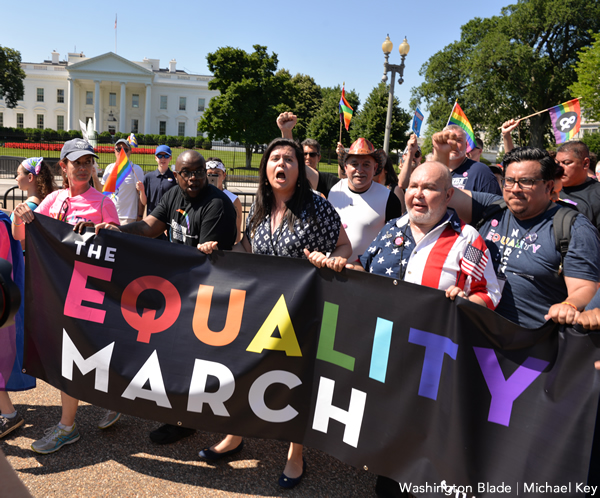
Organizers estimated between 50,000-80,000 participated in the Equality March. (Washington Blade photo by Michael Key)
Tens of thousands of protesters took to the streets this year for the National Equality March on Washington, including many demonstrators who waved Pride flags and carried signs in opposition to President Trump.
An estimated 50,000-80,000 people demonstrated in the streets of D.C. and marched in front of the White House before emptying onto the National Mall.
The Women’s March on Washington, which drew between 440,000 to 500,000 people as well as 5 million supporters worldwide, served as the inspiration for the Equality March. The idea came about after New York gay activist David Bruinooge started a Facebook page scheduling the march for D.C. on June 11.
Although protesters were energized, the media attention to the march was scant in comparison to coverage of the Women’s March. Some insiders said the event was haphazardly organized and saved at the last minute by contributions from the Human Rights Campaign and Planned Parenthood. The Washington Blade also made a financial contribution to the march.
3. Supreme Court hears Masterpiece Cakeshop case
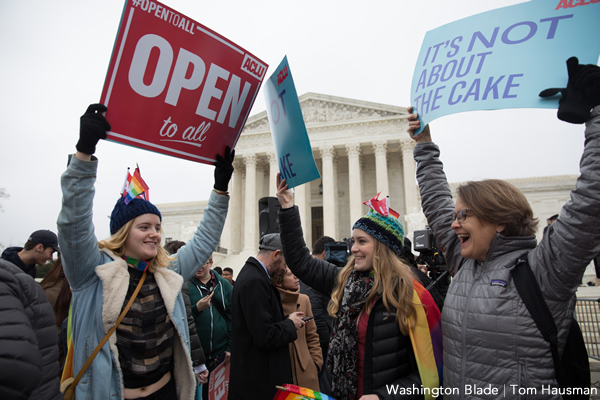
Activists gather in front of the United States Supreme Court on Dec. 5 during oral arguments in the Masterpiece Cakeshop case. (Washington Blade photo by Tom Hausman)
In its first major consideration of a gay rights case since the ruling for marriage equality, the U.S. Supreme Court this year heard arguments on whether the First Amendment allows a Colorado baker to deny making wedding cakes to same-sex couples despite a state non-discrimination law.
The Supreme Court agreed to take up the Masterpiece Cakeshop case after state courts determined Jack Phillips violated the Colorado Anti-Discrimination Act by refusing to make wedding cakes for Charlie Craig and David Mullins, who sought to purchase a custom-made cake for their wedding in 2012, but were denied service.
U.S. Associate Justice Anthony Kennedy gave conflicting signals during oral arguments. At times, Kennedy expressed concern about the dignity of the same-sex couple, but Kennedy also expressed consternation Colorado wasn’t tolerant of Phillips’ religious beliefs.
Oral arguments yielded no clear indication of how the court will rule. A decision is expected in June.
2. Trans candidates score historic wins
Transgender candidates won a slew of historic victories in local races this year on Election Day, a milestone that could lead to more wins in 2018.
The most prominent win belonged to Danica Roem, a transgender journalist in Virginia who unseated notoriously anti-LGBT Del. Bob Marshall. Roem was set to become the first openly transgender person elected and seated in a state legislature in the United States.
Other transgender candidates — Andrew Jenkins and Phillipe Cunningham — claimed notable victories in the election for the Minneapolis City Council. Both were the first transgender candidates elected to a major U.S. city council and the first transgender people of color elected in any public office in the United States.
Meanwhile, Tyler Titus won election to the Erie School Board in Pennsylvania, Lisa Middleton won election to the Palm Springs City Council and Stephe Koontz won a spot on the Doraville City Council in Georgia.
1. Trump takes office, breaks promise to support LGBT Americans
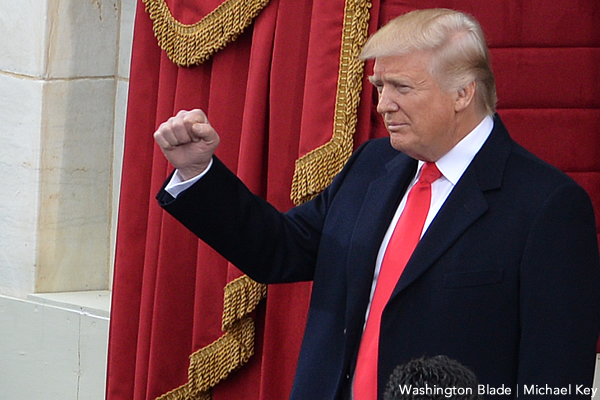
Donald Trump took office this year and almost immediately began attacking LGBT rights. (Washington Blade file photo by Michael Key)
Although President Trump campaigned in 2016 on being a friend to LGBT people, his first year in office was marked by an erosion of LGBT rights after significant gains in recent years.
Click HERE to continue.
homepage news
Honoring the legacy of New Orleans’ 1973 UpStairs Lounge fire
Why the arson attack that killed 32 gay men still resonates 50 years later

On June 23 of last year, I held the microphone as a gay man in the New Orleans City Council Chamber and related a lost piece of queer history to the seven council members. I told this story to disabuse all New Orleanians of the notion that silence and accommodation, in the face of institutional and official failures, are a path to healing.
The story I related to them began on a typical Sunday night at a second-story bar on the fringe of New Orleans’ French Quarter in 1973, where working-class men would gather around a white baby grand piano and belt out the lyrics to a song that was the anthem of their hidden community, “United We Stand” by the Brotherhood of Man.
“United we stand,” the men would sing together, “divided we fall” — the words epitomizing the ethos of their beloved UpStairs Lounge bar, an egalitarian free space that served as a forerunner to today’s queer safe havens.
Around that piano in the 1970s Deep South, gays and lesbians, white and Black queens, Christians and non-Christians, and even early gender minorities could cast aside the racism, sexism, and homophobia of the times to find acceptance and companionship for a moment.
For regulars, the UpStairs Lounge was a miracle, a small pocket of acceptance in a broader world where their very identities were illegal.
On the Sunday night of June 24, 1973, their voices were silenced in a murderous act of arson that claimed 32 lives and still stands as the deadliest fire in New Orleans history — and the worst mass killing of gays in 20th century America.
As 13 fire companies struggled to douse the inferno, police refused to question the chief suspect, even though gay witnesses identified and brought the soot-covered man to officers idly standing by. This suspect, an internally conflicted gay-for-pay sex worker named Rodger Dale Nunez, had been ejected from the UpStairs Lounge screaming the word “burn” minutes before, but New Orleans police rebuffed the testimony of fire survivors on the street and allowed Nunez to disappear.
As the fire raged, police denigrated the deceased to reporters on the street: “Some thieves hung out there, and you know this was a queer bar.”
For days afterward, the carnage met with official silence. With no local gay political leaders willing to step forward, national Gay Liberation-era figures like Rev. Troy Perry of the Metropolitan Community Church flew in to “help our bereaved brothers and sisters” — and shatter officialdom’s code of silence.
Perry broke local taboos by holding a press conference as an openly gay man. “It’s high time that you people, in New Orleans, Louisiana, got the message and joined the rest of the Union,” Perry said.
Two days later, on June 26, 1973, as families hesitated to step forward to identify their kin in the morgue, UpStairs Lounge owner Phil Esteve stood in his badly charred bar, the air still foul with death. He rebuffed attempts by Perry to turn the fire into a call for visibility and progress for homosexuals.
“This fire had very little to do with the gay movement or with anything gay,” Esteve told a reporter from The Philadelphia Inquirer. “I do not want my bar or this tragedy to be used to further any of their causes.”
Conspicuously, no photos of Esteve appeared in coverage of the UpStairs Lounge fire or its aftermath — and the bar owner also remained silent as he witnessed police looting the ashes of his business.
“Phil said the cash register, juke box, cigarette machine and some wallets had money removed,” recounted Esteve’s friend Bob McAnear, a former U.S. Customs officer. “Phil wouldn’t report it because, if he did, police would never allow him to operate a bar in New Orleans again.”
The next day, gay bar owners, incensed at declining gay bar traffic amid an atmosphere of anxiety, confronted Perry at a clandestine meeting. “How dare you hold your damn news conferences!” one business owner shouted.
Ignoring calls for gay self-censorship, Perry held a 250-person memorial for the fire victims the following Sunday, July 1, culminating in mourners defiantly marching out the front door of a French Quarter church into waiting news cameras. “Reverend Troy Perry awoke several sleeping giants, me being one of them,” recalled Charlene Schneider, a lesbian activist who walked out of that front door with Perry.

Esteve doubted the UpStairs Lounge story’s capacity to rouse gay political fervor. As the coroner buried four of his former patrons anonymously on the edge of town, Esteve quietly collected at least $25,000 in fire insurance proceeds. Less than a year later, he used the money to open another gay bar called the Post Office, where patrons of the UpStairs Lounge — some with visible burn scars — gathered but were discouraged from singing “United We Stand.”
New Orleans cops neglected to question the chief arson suspect and closed the investigation without answers in late August 1973. Gay elites in the city’s power structure began gaslighting the mourners who marched with Perry into the news cameras, casting suspicion on their memories and re-characterizing their moment of liberation as a stunt.
When a local gay journalist asked in April 1977, “Where are the gay activists in New Orleans?,” Esteve responded that there were none, because none were needed. “We don’t feel we’re discriminated against,” Esteve said. “New Orleans gays are different from gays anywhere else… Perhaps there is some correlation between the amount of gay activism in other cities and the degree of police harassment.”

An attitude of nihilism and disavowal descended upon the memory of the UpStairs Lounge victims, goaded by Esteve and fellow gay entrepreneurs who earned their keep via gay patrons drowning their sorrows each night instead of protesting the injustices that kept them drinking.
Into the 1980s, the story of the UpStairs Lounge all but vanished from conversation — with the exception of a few sanctuaries for gay political debate such as the local lesbian bar Charlene’s, run by the activist Charlene Schneider.
By 1988, the 15th anniversary of the fire, the UpStairs Lounge narrative comprised little more than a call for better fire codes and indoor sprinklers. UpStairs Lounge survivor Stewart Butler summed it up: “A tragedy that, as far as I know, no good came of.”
Finally, in 1991, at Stewart Butler and Charlene Schneider’s nudging, the UpStairs Lounge story became aligned with the crusade of liberated gays and lesbians seeking equal rights in Louisiana. The halls of power responded with intermittent progress. The New Orleans City Council, horrified by the story but not yet ready to take its look in the mirror, enacted an anti-discrimination ordinance protecting gays and lesbians in housing, employment, and public accommodations that Dec. 12 — more than 18 years after the fire.
“I believe the fire was the catalyst for the anger to bring us all to the table,” Schneider told The Times-Picayune, a tacit rebuke to Esteve’s strategy of silent accommodation. Even Esteve seemed to change his stance with time, granting a full interview with the first UpStairs Lounge scholar Johnny Townsend sometime around 1989.
Most of the figures in this historic tale are now deceased. What’s left is an enduring story that refused to go gently. The story now echoes around the world — a musical about the UpStairs Lounge fire recently played in Tokyo, translating the gay underworld of the 1973 French Quarter for Japanese audiences.
When I finished my presentation to the City Council last June, I looked up to see the seven council members in tears. Unanimously, they approved a resolution acknowledging the historic failures of city leaders in the wake of the UpStairs Lounge fire.
Council members personally apologized to UpStairs Lounge families and survivors seated in the chamber in a symbolic act that, though it could not bring back those who died, still mattered greatly to those whose pain had been denied, leaving them to grieve alone. At long last, official silence and indifference gave way to heartfelt words of healing.
The way Americans remember the past is an active, ongoing process. Our collective memory is malleable, but it matters because it speaks volumes about our maturity as a people, how we acknowledge the past’s influence in our lives, and how it shapes the examples we set for our youth. Do we grapple with difficult truths, or do we duck accountability by defaulting to nostalgia and bluster? Or worse, do we simply ignore the past until it fades into a black hole of ignorance and indifference?
I believe that a factual retelling of the UpStairs Lounge tragedy — and how, 50 years onward, it became known internationally — resonates beyond our current divides. It reminds queer and non-queer Americans that ignoring the past holds back the present, and that silence is no cure for what ails a participatory nation.
Silence isolates. Silence gaslights and shrouds. It preserves the power structures that scapegoat the disempowered.
Solidarity, on the other hand, unites. Solidarity illuminates a path forward together. Above all, solidarity transforms the downtrodden into a resounding chorus of citizens — in the spirit of voices who once gathered ‘round a white baby grand piano and sang, joyfully and loudly, “United We Stand.”

Robert W. Fieseler is a New Orleans-based journalist and the author of “Tinderbox: the Untold Story of the Up Stairs Lounge Fire and the Rise of Gay Liberation.”
homepage news
New Supreme Court term includes critical LGBTQ case with ‘terrifying’ consequences
Business owner seeks to decline services for same-sex weddings

The U.S. Supreme Court, after a decision overturning Roe v. Wade that still leaves many reeling, is starting a new term with justices slated to revisit the issue of LGBTQ rights.
In 303 Creative v. Elenis, the court will return to the issue of whether or not providers of custom-made goods can refuse service to LGBTQ customers on First Amendment grounds. In this case, the business owner is Lorie Smith, a website designer in Colorado who wants to opt out of providing her graphic design services for same-sex weddings despite the civil rights law in her state.
Jennifer Pizer, acting chief legal officer of Lambda Legal, said in an interview with the Blade, “it’s not too much to say an immeasurably huge amount is at stake” for LGBTQ people depending on the outcome of the case.
“This contrived idea that making custom goods, or offering a custom service, somehow tacitly conveys an endorsement of the person — if that were to be accepted, that would be a profound change in the law,” Pizer said. “And the stakes are very high because there are no practical, obvious, principled ways to limit that kind of an exception, and if the law isn’t clear in this regard, then the people who are at risk of experiencing discrimination have no security, no effective protection by having a non-discrimination laws, because at any moment, as one makes their way through the commercial marketplace, you don’t know whether a particular business person is going to refuse to serve you.”
The upcoming arguments and decision in the 303 Creative case mark a return to LGBTQ rights for the Supreme Court, which had no lawsuit to directly address the issue in its previous term, although many argued the Dobbs decision put LGBTQ rights in peril and threatened access to abortion for LGBTQ people.
And yet, the 303 Creative case is similar to other cases the Supreme Court has previously heard on the providers of services seeking the right to deny services based on First Amendment grounds, such as Masterpiece Cakeshop and Fulton v. City of Philadelphia. In both of those cases, however, the court issued narrow rulings on the facts of litigation, declining to issue sweeping rulings either upholding non-discrimination principles or First Amendment exemptions.
Pizer, who signed one of the friend-of-the-court briefs in opposition to 303 Creative, said the case is “similar in the goals” of the Masterpiece Cakeshop litigation on the basis they both seek exemptions to the same non-discrimination law that governs their business, the Colorado Anti-Discrimination Act, or CADA, and seek “to further the social and political argument that they should be free to refuse same-sex couples or LGBTQ people in particular.”
“So there’s the legal goal, and it connects to the social and political goals and in that sense, it’s the same as Masterpiece,” Pizer said. “And so there are multiple problems with it again, as a legal matter, but also as a social matter, because as with the religion argument, it flows from the idea that having something to do with us is endorsing us.”
One difference: the Masterpiece Cakeshop litigation stemmed from an act of refusal of service after owner, Jack Phillips, declined to make a custom-made wedding cake for a same-sex couple for their upcoming wedding. No act of discrimination in the past, however, is present in the 303 Creative case. The owner seeks to put on her website a disclaimer she won’t provide services for same-sex weddings, signaling an intent to discriminate against same-sex couples rather than having done so.
As such, expect issues of standing — whether or not either party is personally aggrieved and able bring to a lawsuit — to be hashed out in arguments as well as whether the litigation is ripe for review as justices consider the case. It’s not hard to see U.S. Chief Justice John Roberts, who has sought to lead the court to reach less sweeping decisions (sometimes successfully, and sometimes in the Dobbs case not successfully) to push for a decision along these lines.
Another key difference: The 303 Creative case hinges on the argument of freedom of speech as opposed to the two-fold argument of freedom of speech and freedom of religious exercise in the Masterpiece Cakeshop litigation. Although 303 Creative requested in its petition to the Supreme Court review of both issues of speech and religion, justices elected only to take up the issue of free speech in granting a writ of certiorari (or agreement to take up a case). Justices also declined to accept another question in the petition request of review of the 1990 precedent in Smith v. Employment Division, which concluded states can enforce neutral generally applicable laws on citizens with religious objections without violating the First Amendment.
Representing 303 Creative in the lawsuit is Alliance Defending Freedom, a law firm that has sought to undermine civil rights laws for LGBTQ people with litigation seeking exemptions based on the First Amendment, such as the Masterpiece Cakeshop case.
Kristen Waggoner, president of Alliance Defending Freedom, wrote in a Sept. 12 legal brief signed by her and other attorneys that a decision in favor of 303 Creative boils down to a clear-cut violation of the First Amendment.
“Colorado and the United States still contend that CADA only regulates sales transactions,” the brief says. “But their cases do not apply because they involve non-expressive activities: selling BBQ, firing employees, restricting school attendance, limiting club memberships, and providing room access. Colorado’s own cases agree that the government may not use public-accommodation laws to affect a commercial actor’s speech.”
Pizer, however, pushed back strongly on the idea a decision in favor of 303 Creative would be as focused as Alliance Defending Freedom purports it would be, arguing it could open the door to widespread discrimination against LGBTQ people.
“One way to put it is art tends to be in the eye of the beholder,” Pizer said. “Is something of a craft, or is it art? I feel like I’m channeling Lily Tomlin. Remember ‘soup and art’? We have had an understanding that whether something is beautiful or not is not the determining factor about whether something is protected as artistic expression. There’s a legal test that recognizes if this is speech, whose speech is it, whose message is it? Would anyone who was hearing the speech or seeing the message understand it to be the message of the customer or of the merchants or craftsmen or business person?”
Despite the implications in the case for LGBTQ rights, 303 Creative may have supporters among LGBTQ people who consider themselves proponents of free speech.
One joint friend-of-the-court brief before the Supreme Court, written by Dale Carpenter, a law professor at Southern Methodist University who’s written in favor of LGBTQ rights, and Eugene Volokh, a First Amendment legal scholar at the University of California, Los Angeles, argues the case is an opportunity to affirm the First Amendment applies to goods and services that are uniquely expressive.
“Distinguishing expressive from non-expressive products in some contexts might be hard, but the Tenth Circuit agreed that Smith’s product does not present a hard case,” the brief says. “Yet that court (and Colorado) declined to recognize any exemption for products constituting speech. The Tenth Circuit has effectively recognized a state interest in subjecting the creation of speech itself to antidiscrimination laws.”
Oral arguments in the case aren’t yet set, but may be announced soon. Set to defend the state of Colorado and enforcement of its non-discrimination law in the case is Colorado Solicitor General Eric Reuel Olson. Just this week, the U.S. Supreme Court announced it would grant the request to the U.S. solicitor general to present arguments before the justices on behalf of the Biden administration.
With a 6-3 conservative majority on the court that has recently scrapped the super-precedent guaranteeing the right to abortion, supporters of LGBTQ rights may think the outcome of the case is all but lost, especially amid widespread fears same-sex marriage would be next on the chopping block. After the U.S. Tenth Circuit Court of Appeals ruled against 303 Creative in the lawsuit, the simple action by the Supreme Court to grant review in the lawsuit suggests they are primed to issue a reversal and rule in favor of the company.
Pizer, acknowledging the call to action issued by LGBTQ groups in the aftermath of the Dobbs decision, conceded the current Supreme Court issuing the ruling in this case is “a terrifying prospect,” but cautioned the issue isn’t so much the makeup of the court but whether or not justices will continue down the path of abolishing case law.
“I think the question that we’re facing with respect to all of the cases or at least many of the cases that are in front of the court right now, is whether this court is going to continue on this radical sort of wrecking ball to the edifice of settled law and seemingly a goal of setting up whole new structures of what our basic legal principles are going to be. Are we going to have another term of that?” Pizer said. “And if so, that’s terrifying.”
homepage news
Kelley Robinson, a Black, queer woman, named president of Human Rights Campaign
Progressive activist a veteran of Planned Parenthood Action Fund

Kelley Robinson, a Black, queer woman and veteran of Planned Parenthood Action Fund, is to become the next president of the Human Rights Campaign, the nation’s leading LGBTQ group announced on Tuesday.
Robinson is set to become the ninth president of the Human Rights Campaign after having served as executive director of Planned Parenthood Action Fund and more than 12 years of experience as a leader in the progressive movement. She’ll be the first Black, queer woman to serve in that role.
“I’m honored and ready to lead HRC — and our more than three million member-advocates — as we continue working to achieve equality and liberation for all Lesbian, Gay, Bisexual, Transgender, and Queer people,” Robinson said. “This is a pivotal moment in our movement for equality for LGBTQ+ people. We, particularly our trans and BIPOC communities, are quite literally in the fight for our lives and facing unprecedented threats that seek to destroy us.”
The next Human Rights Campaign president is named as Democrats are performing well in polls in the mid-term elections after the U.S. Supreme Court overturned Roe v. Wade, leaving an opening for the LGBTQ group to play a key role amid fears LGBTQ rights are next on the chopping block.
“The overturning of Roe v. Wade reminds us we are just one Supreme Court decision away from losing fundamental freedoms including the freedom to marry, voting rights, and privacy,” Robinson said. “We are facing a generational opportunity to rise to these challenges and create real, sustainable change. I believe that working together this change is possible right now. This next chapter of the Human Rights Campaign is about getting to freedom and liberation without any exceptions — and today I am making a promise and commitment to carry this work forward.”
The Human Rights Campaign announces its next president after a nearly year-long search process after the board of directors terminated its former president Alphonso David when he was ensnared in the sexual misconduct scandal that led former New York Gov. Andrew Cuomo to resign. David has denied wrongdoing and filed a lawsuit against the LGBTQ group alleging racial discrimination.




















